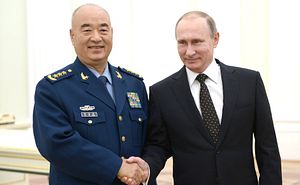China and Russia will hold their first computer-assisted missile defense drill in May, according to the press office of the Russian Ministry of Defense.
“The Russian and Chinese defense ministers decided to hold the first Air and Space Security 2016 joint computer-assisted command and staff exercise in May 2016 on the premises of the Central Research Institute of the Russian Defense Ministry’s Aerospace Defense Force to practice missile defense,” the press release reads.
“The exercise will aim to practice combined operations of Russian and Chinese air and missile defense task forces to provide protection from accidental and provocative attacks of ballistic and cruise missiles,” it adds. The Russian defense ministry also noted that the drill is not directed against a third country.
As I reported last week (See: “China and Russia to Increase Number of Military Exercises in 2016”), Chinese Defense Minister General Chang Wanquan and Russia’s Defense Minister Sergey Shoigu recently pledged to deepen military cooperation between the two countries.
China and Russia do not have a formal military alliance. This handicaps deeper military cooperation between the two countries and makes exercises that practice complex integrated military operations difficult if not impossible to conduct. As a result, joint Sino-Russian exercises have mostly political value and are aimed to showcase the growing informal military partnership between Beijing and Moscow.
As I explained last week:
China and Russia have steadily increased the number of military exercises over the past year. In 2015, both countries held naval and amphibious assault exercises in the Sea of Japan, a smaller naval drill in the Mediterranean, among a number of other bilateral military exchanges. Both countries have also participated in trilateral, and multilateral exercises, for example, under the umbrella of the Shanghai Cooperation Organization (SCO).
In addition, I noted:
Joint military exercises still provide several benefits to both countries, in particular for the Chinese People’s Liberation Army, Navy, and Air Force given that China has not fought a full-scale war in decades. Next to serving a confidence building function, the drills help improve Chinese and Russian tactical and operational capabilities.
As perhaps another sign of a deepening security partnership, China and Russia have issued a statement urging the United States and South Korea to desist from stationing the so-called Terminal High Altitude Area Defense (THAAD) system on the Korean Peninsula.
During a joint press release on April 29, Russian Foreign Minister Sergei Lavrov and Chinese Foreign Minister Wang Yi said that the United States should respect “the legitimate concerns” of China and Russia over THAAD, according to Reuters.
“This move goes beyond the defensive needs of the relevant countries. If it is deployed it will directly impact China’s and Russia’s respective strategic security,” the Chinese foreign minister added. “Not only does it threaten the resolution of the peninsula nuclear issue, it quite possibly could pour oil on the fire of an already tense situation, and even destroy strategic equilibrium on the peninsula.”

































